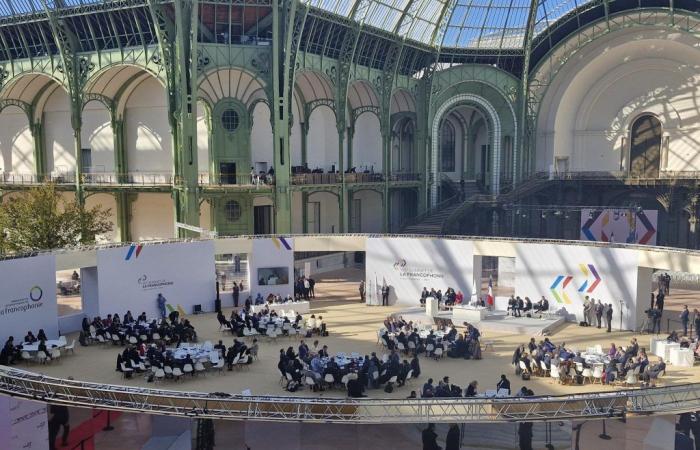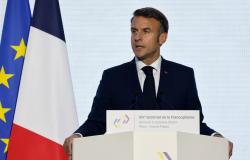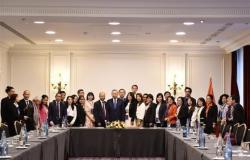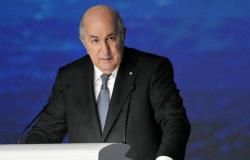Lebanon’s Minister of Information is in Paris on Saturday October 5, where the Francophonie summit is taking place. In an interview with RFI, Ziad Makary explains to our special correspondents, Nicolas Rocca and Robin Cussenot, the reason for his presence in France, while his country is going through an extremely serious crisis.
RFI: Your country is going through one of the most serious crises in its history. Why did you come here? Did you come to seek support from other members of the OIF ?
Ziad Makary: My country is at war. Lebanon is a founding member of the Francophonie, we are always at the summits, but the Prime Minister could not come, he cannot leave Lebanon, and I myself would not have wanted to leave Lebanon . But someone has to represent my country. So, we are here, and every time we are outside Lebanon, we talk, we say what is happening at home. It’s okay to ask for help.
We are counting a lot on France. I think it is the only country that has a real intention, a good intention for Lebanon. President Macron has said this several times. Also on Friday, there was a beautiful message with Hiba Tawaji, who sang for Beirut, this had been requested by President Emmanuel Macron personally. Today I have a speech. And we’re going to talk about Lebanon, about what’s happening.
Are you satisfied with France’s statements? Do you hope for a slightly stronger condemnation of Israel’s actions towards the Lebanese people? What are the words you’re really waiting for?
We would have liked there to be a very clear condemnation of French-speaking countries. But unfortunately, we couldn’t even name Israel in the declaration, because every time we name Israel, there are many countries that are in solidarity with Israel, unfortunately. They cannot see what is happening in Lebanon.
I would like to say now that we have more than 2,000 victims, 1.2 million displaced people. Among the victims, we have 110 or 120 rescuers, members of the civil defense… Beirut is bombed every day. Today, the Israeli army bombed North Lebanon too. It never stops.
For the first time in a year, the Lebanese army fired on Israel this week, the army responded. As you said, there were a lot of bombings, extremely clear attacks on the integrity of the territory of Lebanon, in the capital, in the Bekaa, and ground operations in the south. Why did the Lebanese army decide to react now?
The Lebanese army is responsible for defending Lebanese territory, so it reacts when it is necessary to react. There are already two martyrs, two soldiers who have been killed by Israel. That’s why I say it’s not okay. On all fronts, this is wrong. I even read that Israel had threatened UNIFIL, the international force of the United Nations, which is in the South. They threatened them that they must leave their positions. There are no more limits to what happens.
Precisely, this UN force for peace appears a little powerless. What are UNIFIL members still used for on the ground?
They are part of resolution 1701. They must be in Lebanon. Already, they are observing violations of this resolution. I would like to say that Israel has violated this resolution, since 2006, 56,000 times – air, land and sea. So UNIFIL must stay. But I don’t trust Israel, after everything we saw in Gaza. They assassinated members of the United Nations, of many international organizations. I expect a lot of bad days, unfortunately.
What lasting solution, in your opinion, to try to resolve this southern border problem? What does the Lebanese government recommend?
We already have a conflict regarding two parts of Lebanese territory. Lebanon says the Chebaa and Kfar Chouba farms belong to Lebanon. However, they are occupied by Israel. We must already start talking about this, negotiating this. What scares me is that the war is not going to be limited to Lebanon. I think maybe it will go on a regional scale. Unfortunately also, with everything that is happening between Iran and Israel, armed factions in Iraq, the Houthis, the whole region could suddenly burst into flames.
It has now been two years since the country officially had a government. Where are the efforts between Lebanese political groups to appoint a President of the Republic and a government? Is it not too late, given the very degraded military situation?
A president alone cannot save this situation. We will need a president, that’s for sure. But I don’t think anyone is going to speed things up now, since we’re in a war. So there are priorities, unfortunately. The Lebanese Constitution is very complicated. I say that it was made to hinder a lot of work. It’s a political class that represents religions, confessions, that complicates everything, every time there are elections, every time there is a new president. We hope to have a president, because the government does not function in a positive way, nor does Parliament. But I tell you again: now, there are priorities. The country is at war, we have many economic, constitutional and social problems.
The death of Hassan Nasrallah, the leader of Hezbollah, generated extremely different reactions among the Lebanese population. How can we ensure that this crisis does not further increase disputes between religious groups in Lebanon?
Unfortunately, the internal situation is not going well. Also, the assassination of Hassan Nasrallah generated a lot of changes, a lot of hatred. There, I say that in the country, unfortunately, we have a lot of hatred, a lot of blood, a lot of divisions. And we have a lot of work to do after this war.
Read alsoOn the second day of the OIF summit, membership and the Middle East question






